Video Feature & Web-Exclusive Interview
Artist: ERIN IVEY
Video: “Lost Girl”
ERIN IVEY RELEASES EMOTIONALLY HAUNTING “LOST GIRL” FROM HER NEW ALBUM SOLACE IN THE WILD
Erin Ivey’s Solace in the Wild was three years in the making. She recorded the album at Blue Rock Studio in Wimberley, Texas. It was released January 29, 2021.
Ivey’s albums have garnered numerous Top 10 and Album of the Year recognitions, a Black Fret artist grant and placements in movie soundtracks, advertisements and TV shows (Suits and The Client List). She is also a regular Critics’ Pick at SXSW.
Erin Ivey speaks her truth with honesty and insight gained through the years—making dreams into reality. Her lyrics illuminate the imagination, taking the listener along a remarkable journey—always looking forward to see what lies beyond the horizon, beyond her dreams—to her solace in the wild.
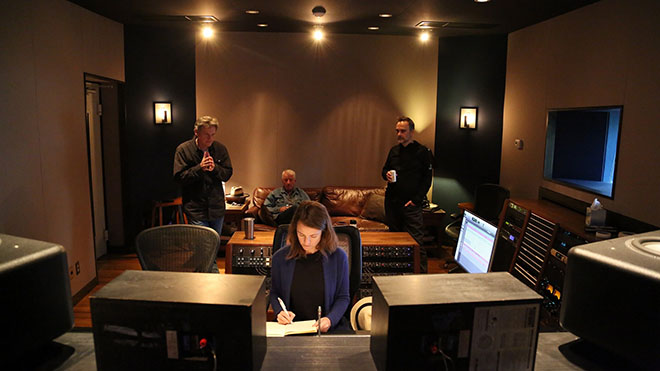
Erin Ivey at Blue Rock Studio – Photo credit Justin Kirchhoff
We talked with Erin Ivey about her songs that empower listeners to let go of the things that hold them back, her new-found independence, her unique approach to songwriting, and how determination dictates her path and continues to inspire her journey.
ERIN IVEY Interview
with M Music & Musicians magazine publisher, Merlin David
How did the idea of “Lost Girl” come to you?
It was an idea from my producer/co-writer Chuck Pinnell, who is an amazing guitar player and writer. We started writing seven years ago—getting together once or twice a month to write and share ideas. It was always on a Friday, so my step-daughter started calling him “Friday Chuck.” He played this beautiful song on guitar and suggested the title “Lost Girl.” I immediately imagined a young woman swimming in Hamilton Pool—a natural pool created when a cave collapsed thousands of years ago, just outside Austin, Texas. Visions came—of this girl floating between the worlds above and below the water, trying to balance it all, hold it all together as it is all holding her at the same time. When things are on fire around her, she’s safe in the water. I drew from my own dreams, too. Sometimes in my dreams, I wish I could breathe under water and then remember I can, so I do and the whole dream shifts into this state of wonder. I like how you have to suspend disbelief or live in metaphor or dreams for this idea to make sense.
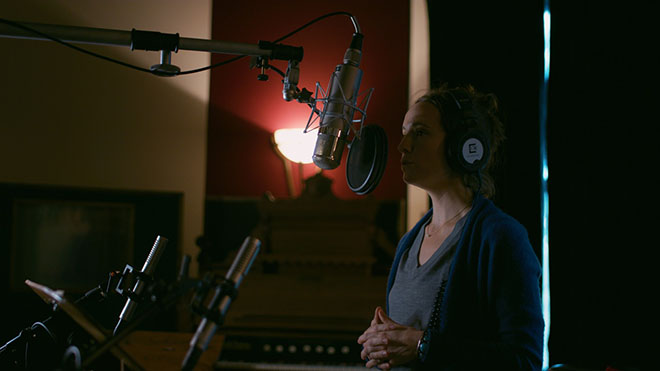
Erin Ivey at Blue Rock Studio – Photo credit Justin Kirchhoff
Briefly tell us how the album evolved.
Chuck and I met a decade ago. We created a unique arrangement of “Johnny Has Gone for a Soldier” in Gaelic and English—for an album he was working on. We enjoyed working together and over the years—Chuck imagined and coaxed this project into being. I had to drop out of music for a few years to take corporate jobs that kept me on the road a lot. I’m so thankful to have had the idea of this album to keep me connected to Austin and to music. I won a $10K artist grant from Black Fret to create new music. At the end of 2018, I began to write and perform music full-time again. I used the Black Fret grant money to record 10 songs over three days at Blue Rock Artist Ranch & Studio in Wimberley, Texas. Covid-19 postponed an earlier release date. With Dave McClinton’s artwork and manufacturing funded by friends and fans through a crowdfunding campaign, we are finally releasing the album.
Erin Ivey speaks her truth with honesty and insight gained through the years—making dreams into reality. Her lyrics illuminate the imagination, taking the listener along a remarkable journey—always looking forward to see what lies beyond the horizon, beyond her dreams—to her solace in the wild.
What is one thing you learned about yourself after you recorded this album?
I learned to trust and rely on others. A lot of times I buy into the myth of perfection and get scared what I do will not be perfect, so I sabotage it or get really controlling. This time, so much was out of my control. I trusted Chuck’s choices, which were so good. I just had to get out of the way. I’m still learning how to enjoy the threads rather than having to see the whole tapestry to appreciate it.
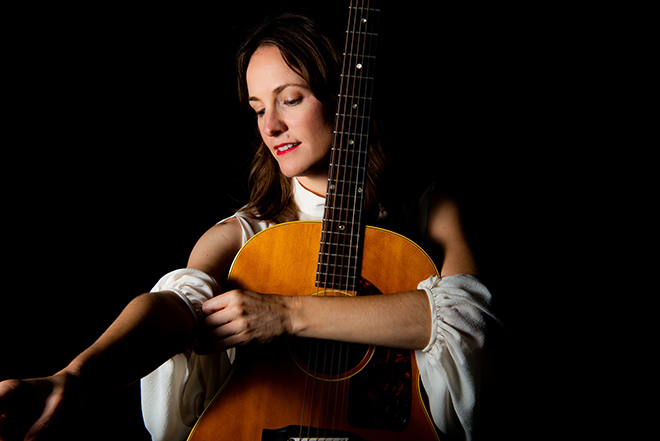
Photo credit Nicola Gell
What songwriting tip would you like to offer?
Just keep writing. Find the “play” aspect in it—which gets to the heart of what music means for us. I use lots of games to coax the song out. I need my eyes and soul to be receptive. But usually, it’s a deadline. (Laughs) I recently re-joined a songwriting group where we have to have a song every two weeks. It’s important to write and keep writing.
What are your essential songwriting tools?
I can’t live without my phone. I used to carry around a heavy old SLR camera and clunky cassette tape recorder—everywhere. I still carry my journal at all times, but now everything else I need is on my phone. The mic and camera quality are excellent. And when I get discouraged or need advice or connection, there’s an amazing community of supportive creative entrepreneur friends at the other end of a phone call.
What is your main instrument?
My favorite is a 1964 Epiphone FT-45 Cortez—cousin to the Epiphone Texan made famous by Paul McCartney. It has a beautiful soul. It calls to me. It rings with sustain. I’d stopped into Austin Vintage Guitars in March 2019 looking for something from the 1930s, but this Cortez kept calling out to me. My friend and collaborator Goody (David Goodrich, whom you may know from producing and playing with Chris Smither) happened to be at the store that day. He systematically brought me every acoustic guitar in the shop to play—one at a time. I kept going back to the Cortez. I’ll always be grateful to Goody for his time and insight. I love that guitar. When I was working with Christopher Cross, he had my Guild sent over to Dick Dubois to be set up properly. It made such a big difference. Dick now works on all my instruments. Most recently, he installed an LR Baggs Element in the Cortez. It sounds so good. I really like my Kyser Capo and I use Martin strings. At a writing retreat last year, just before the pandemic, Edie Carey let me borrow her Martin 000-16. It made my knees buckle. It felt great, just the right size, amazing tone. Now, I’m on the lookout for one of those.
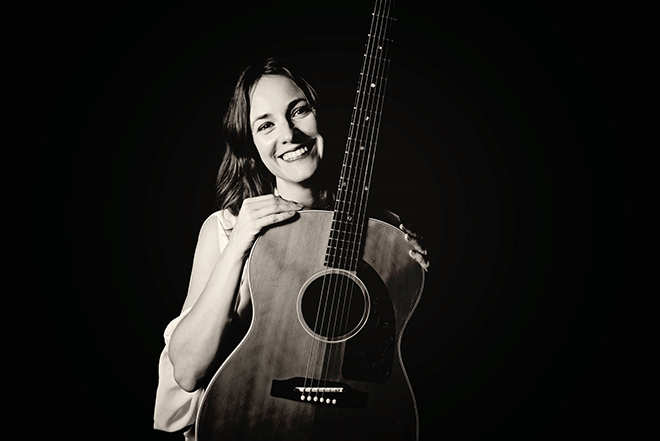
Photo credit Nicola Gell
What equipment helps you in the studio?
I use a Neumann KMS 105 mic—which I love! I used one at my very first jazz gig in 2006 and was instantly enchanted by its clarity and truth. I have carried one with me ever since. I always have a Shure SM58. Did you see Bruce Springsteen’s performance at the Inauguration concert? He was using an SM58. At home, I use Blue mics (the original 2006 Bluebird) for demo recordings and a Snowball that plugs right into my computer for interviews and video calls. And I can’t live without my Beyerdynamic DT770 Pro headphones.
What does Chuck Pinnell use?
Chuck plays a Collings DS2H acoustic and a Collings MTO Mandolin—they both have an amazing sound. You should check out Chuck’s IMDB page. He comes from a film score and TV composition background. And his first novel is being published later this year. He’s a man of many talents.
How did Chuck help you realize the full potential of these songs?
Chuck pulled in all sorts of unusual instruments to create a tapestry of sound that unifies the whole album—cittern, glockenspiel, octave mandolin. Chuck arranges them to give a solid character to the album. Some of the longer songs have multiple movements that take you on a journey Chuck created for us. He put together a very strong band. Each of the players is so good. It all comes together to elevate the songs from lyrics on a page to a storybook in your imagination.
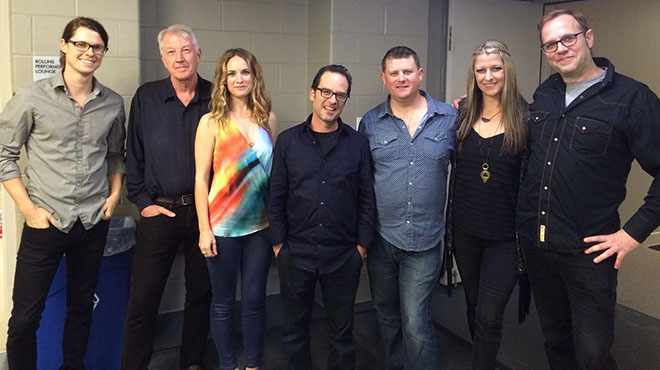
band backstage at The Long Center
Which Top 5 Musicians inspired you to become a musician?
My Grandma is a classically trained vocalist and music teacher who was always trying to give me voice and Kodály lessons as a kid. I didn’t appreciate them at the time, but I use everything she taught me—especially the love, joy and spiritual gifts of singing.
Billie Holiday delivered phrases with childlike wonder yet grounded in the deep well of eternal sadness. Her soul is magnetic.
David Gilmour was a huge part of the Pink Floyd sound. Hearing his voice and his tone and choices on guitar—makes me want to crawl into the speakers and get lost, and then go practice my guitar.
Harriet Wheeler of the Sundays—singing harmonies along with those records is one of my favorite things. To hear how she crafts melodies and words together so mellifluously inspires me to be more free.
That girl drummer I saw hop on a kit during theater rehearsal when I was 11. She was so cool.
What are your Top 5 favorite albums of all time?
Blind (1992)—The Sundays
Kaya (1978)—Bob Marley
The Dark Side of the Moon (1973)—Pink Floyd
The Bright Mississippi (2009)—Allen Toussaint
Don’t Cry Now (1973)—Linda Ronstadt
Tell us a “pinch me” moment when you thought “Wow, this is really happening to me!”
I was booked on the Grammy Festival at Sea with Heart, Emmylou Harris, Indigo Girls and Shawn Colvin. That was an incredible experience. I met the most amazing artists on that trip. It was my gateway to being involved with The Recording Academy. I’ve also had the great privilege of recording with Christopher Cross and performing with him at ACL Live [Austin City Limits]. And opening for Ralph Stanley was amazing. He doesn’t just sing—he channels.
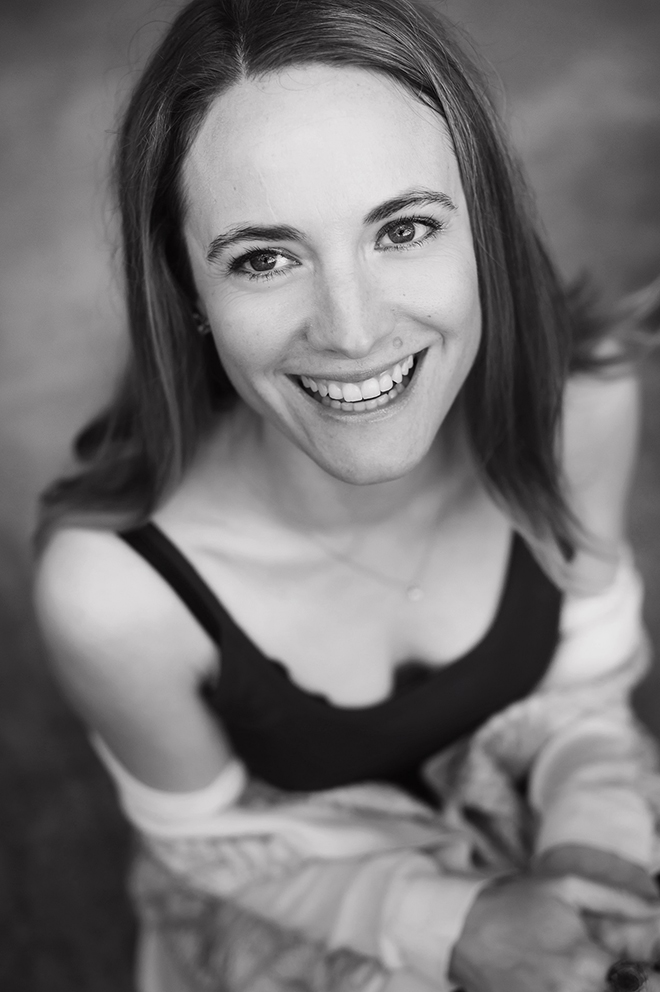
Why was it important to record this album at Blue Rock?
When we went to Blue Rock, the band hadn’t played together for a couple of years. So, being able to stay onsite and focus 100% on the music—made all the difference. High on a ridge in the Texas Hill Country, we ate, slept and breathed this album into being for three days and three nights. The elemental nature of the songs was enhanced by those surroundings and our ability to shut out the world for a few days. Technically, sonically, everything at Blue Rock is so well thought through. The Artist experience is so carefully considered. They’ve thought of everything.
How are they able to do that at Blue Rock?
Studio owner Billy Crockett’s experience as a singer-songwriter, recording and performing artist informs Blue Rock’s approach to every detail—right down to the perfection of the headphone mix when you first put them on. We had access to fine instruments to explore different sounds. The vibe is unparalleled. It just feels great—sounds great. Dodee Crockett is the consummate host. Bobby Arnold is a project manager there. He was the recording engineer out at Willie Nelson’s Pedernales Studio when Willie recorded his own version of Irving Berlin’s 1926 classic “Blue Skies.” It was a total thrill to have him there digging our stripped-down arrangement of the song. How cool is that? Recording engineer Patrick Conway and assistant engineer Sarah Randolph made everything so easy for us. Always ready, always positive—moving things forward. You just get to be the artist. It was a magical experience all around—such a blessing. I can feel the fingerprints of Blue Rock all over Solace in the Wild.
In this unique socio-political climate, how do you remain hopeful?
Having this album project to work on has kept me hopeful for years. That is no less true now. Every day, I get to be reminded “there is solace in the wild, when everything’s on fire.” I am reminded to seek and share that solace, to believe in the importance of the work we do together. There is plenty of work to be done. I am encouraged by the strength of our creative community. Doing this interview gives me hope.
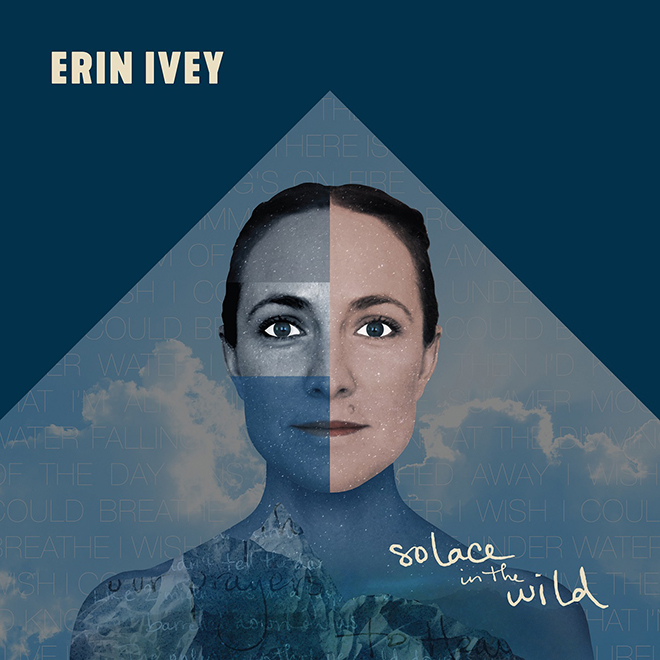
What is the best advice someone has given you?
I opened for JD Souther once and he advised me to always put a handle of whiskey on my rider, because—why not?
Most recent advice I got from Taylor Hanson—who has an amazing history with his music. They started very young—they’re so talented and incredibly kind. He gave me reasons why I should go Indie with this album instead of shopping it around. “This is a game of survival—just keep doing what you’re doing.” I want to keep doing it—make a living, have a life and surround myself with creative people. It’s not about most of the things we conflate into our idea of a music career. It’s just about the music and being able to do it on a regular basis. Let the music find the hearts that it needs to speak to.
Best advice you’d like to give upcoming musicians?
Find a way to do what you love, even if it doesn’t look like you expected.
Where can new fans get more info and stay updated?
www.ErinIvey.com
www.facebook.com/ErinIveyMusicPage
www.instagram.com/erinivey
www.Twitter.com/erinivey
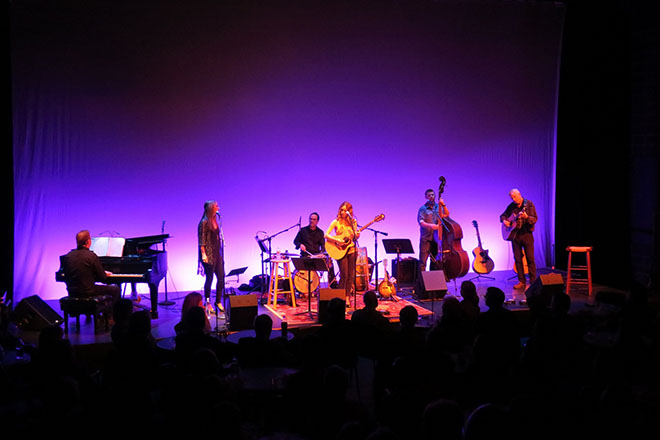




comment closed